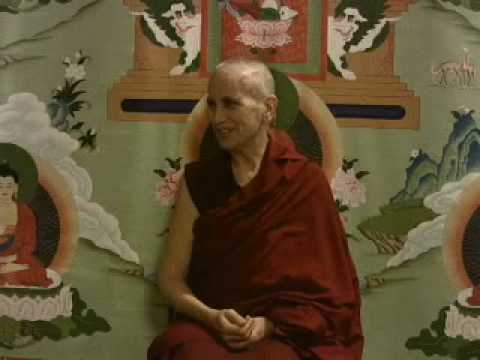Practicing the Dharma, transforming the mind
- The importance of reminding ourselves what practicing the Dharma means
- Counteracting the mind of discouragement
- Identifying correct and incorrect thoughts
I think it’s always good to remember what it means to practice the Dharma and why we’re here. Because practicing Dharma means transforming our mind. And transforming our mind is hard. It’s not going to happen quickly. We have a lot of old habits. One of our old habits is saying, “I can’t transform my mind.” [laughter] The mind that says, “I just can’t do it, the habits are too ingrained. I’m just an angry person. I’m just an attached person. I’m just a self-centered person. There’s nothing to do. I’m hopeless, just give up.”
That mind of discouragement is actually a mind of laziness. Because then we don’t practice, do we? We just give up on ourselves. So we have to realize the incorrect thoughts for what they are instead of following them. Okay? Because an incorrect thought arises in our mind and then we just say, “Well that must be true,” and we follow it. And then of course we’re back in the same old mess because then all of our unhappiness is everybody else’s fault. And then we dig ourselves into a hole. Remember our holes? And we curl up in our holes just like Manju (the kitty) curls up in his kitty basket and we stay in our holes, together with our negative thoughts and our incorrect thoughts.
It’s very important to be able to identify what is a correct thought, what is an incorrect thought. And here I’m just talking on the conventional level. I’m not even talking about grasping at true existence. But of course the grasping at true existence underlies all the incorrect thoughts because we think something is inherently beautiful or inherently awful. So it’s also there. I’m not saying ignore the grasping at inherent existence. Don’t get me wrong. But really try and identify cases of arrogance and jealousy and pride and attachment and wrong views and things like this that come so prominently in the mind. And instead of saluting them and bowing down to them, following their instructions, then to identify, this is the thief that’s been stealing all my virtue. This is the one who’s been making me so miserable all the time. And then call up our forces of wisdom and compassion and counteract those incorrect thoughts.
That’s what practicing the Dharma means. So we have to really remember that. And that’s why we do all the meditations, that’s why we do all the study, that’s why we do the service, that’s why we do all these practices is to be able to identify the difference between a correct and an incorrect mental state and to know the techniques to transform them. So just learning things for the sake of learning them, or reciting mantra and making offerings for the sake of doing them, none of that makes any sense. I mean, it puts some good imprint on our mind, because it’s better than watching the movies on television and playing computer games, so it has some virtue, you know, if we just do it automatically. But the real Dharma practice that we’re all about is confronting those incorrect and harmful thoughts when they arise. And if we do so we’re going to be happy. If we don’t do so we’re going to be miserable. So it makes some sense to try and do that. And it takes some time, so we need some patience with ourselves. We’re not going to get it all at once.
Venerable Thubten Chodron
Venerable Chodron emphasizes the practical application of Buddha’s teachings in our daily lives and is especially skilled at explaining them in ways easily understood and practiced by Westerners. She is well known for her warm, humorous, and lucid teachings. She was ordained as a Buddhist nun in 1977 by Kyabje Ling Rinpoche in Dharamsala, India, and in 1986 she received bhikshuni (full) ordination in Taiwan. Read her full bio.


